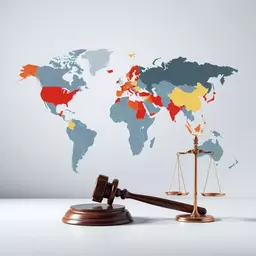Red Notices vs. Arrest Warrants

Understanding the nuances of international law can feel overwhelming, but grasping the differences between Interpol Red Notices and arrest warrants is essential for anyone facing potential extradition. As these legal tools significantly impact lives across borders, knowing their specific functions and implications can empower individuals in navigating complex legal situations.
Key Takeaways
- Red Notices vs. Arrest Warrants: Red Notices are requests for locating and provisionally arresting individuals, while arrest warrants are judicial documents authorizing immediate detention based on specific allegations.
- Legal Authority: Interpol issues Red Notices, but arrest warrants are issued by national judicial authorities, which have legal backing within the issuing country.
- Enforcement Mechanisms: Red Notices are alerts without mandatory enforcement, whereas arrest warrants require immediate action by law enforcement.
- Criteria for Red Notices: They require a valid arrest warrant from a member country and typically involve serious offenses, highlighting the importance of understanding one's legal standing if faced with such notices.
- International Cooperation: Countries often have treaties to facilitate enforcement and extradition, making cooperation vital in responding to both Red Notices and arrest warrants.
- Appeal Mechanisms: Individuals can contest both Red Notices and arrest warrants through specific legal channels, emphasizing the necessity of legal representation for effective navigation of these processes.
- Travel Implications: Receiving a Red Notice or arrest warrant can significantly affect travel plans, as individuals may face arrest in countries recognizing these legal instruments.
- Proactive Legal Strategies: Engaging a legal expert and preparing necessary documentation is crucial for challenging the validity of Red Notices or arrest warrants effectively.
Key Differences Between Red Notices and Arrest Warrants
Understanding the distinctions can empower individuals facing legal challenges.
Issuing Authority
Red Notices are issued by Interpol, while arrest warrants are issued by national judicial systems.
Legal Power
Red Notices are not binding for extradition, whereas arrest warrants carry legal weight and compel arrest.
International Scope
Red Notices can be circulated globally, while arrest warrants are typically limited to the country's jurisdiction.
Legal Process
Challenging a Red Notice involves a different set of legal procedures compared to contesting an arrest warrant.
Understanding the Legal Landscape of Red Notices and Arrest Warrants
As we dive into the complex world of international law, it's essential to grasp the fundamental differences between Interpol Red Notices and arrest warrants. These legal tools play pivotal roles in cross-border legal matters, impacting individuals in various ways. Having worked in this field, I've come to realize that understanding these concepts can significantly influence one’s legal strategy, especially for those facing potential extradition. If you find yourself in such a situation, it's crucial to understand extradition laws in the UAE to prepare your defense.
Defining Red Notices and Arrest Warrants
Before we go any further, let’s clarify what we mean by a Red Notice and an arrest warrant. A Red Notice is essentially a request issued by Interpol to law enforcement worldwide to locate and provisionally arrest an individual pending extradition. In contrast, an arrest warrant is a legal document issued by a judicial authority, permitting law enforcement to detain a person based on specific allegations.
What Constitutes an Interpol Red Notice?
An Interpol Red Notice isn’t an international arrest warrant; rather, it serves as a signal for law enforcement agencies to share information about a wanted person. This notice includes details about the individual and the nature of the allegations. It’s crucial to note that a Red Notice does not compel countries to arrest the individual; it merely alerts them to the request.
Understanding the Nature of Arrest Warrants
Unlike Red Notices, arrest warrants have legal backing within the country where they're issued. They are based on probable cause and must be supported by evidence. Once issued, they allow law enforcement officers to detain individuals and initiate the legal process. Arrest warrants can be executed in various scenarios, such as during a routine traffic stop or at home.
Legal Definitions and Criteria for Red Notices
Red Notices are defined by specific criteria outlined by Interpol. These criteria include:
- The presence of a valid arrest warrant issued by a member country.
- The seriousness of the crime, typically involving serious offenses like murder, human trafficking, or financial fraud.
- The likelihood that the individual will evade prosecution if not apprehended.
Understanding these criteria can help individuals assess their legal standing if they find themselves facing a Red Notice.
The Legal Authority Behind Red Notices and Arrest Warrants
Now that we have defined these terms, let’s explore the legal authority behind their issuance. Interpol and judicial courts serve as the primary bodies behind these legal instruments.
Role of Interpol in Issuing Red Notices
Interpol plays a significant role in the global policing landscape. When a member country seeks a Red Notice, it submits a request to Interpol, which then evaluates it based on international laws and policies. This process ensures that the notice aligns with human rights standards. For more details on how to challenge such notices, consider learning about responding to an Interpol Red Notice.
Judicial Courts and Their Function in Issuing Arrest Warrants
Judicial courts are tasked with issuing arrest warrants based on evidence presented by law enforcement. This involves a legal review to determine whether there’s enough probable cause for arrest. Courts ensure that the rights of the individual are upheld, which is a critical aspect of maintaining justice.
International Cooperation Among Law Enforcement Agencies
Another vital element in this legal landscape is the cooperation between law enforcement agencies across borders. Through treaties and agreements, countries share information and resources to enforce arrest warrants and respond to Red Notices. For instance, many nations have bilateral treaties that facilitate extradition processes, making international cooperation essential.
Comparative Analysis of Legal Force and Enforcement Mechanisms
Understanding the distinctions between Red Notices and arrest warrants can empower individuals facing these legal challenges. Each has its own enforcement mechanisms, which can vary significantly.
Differences in Enforcement: Red Notices vs. Arrest Warrants
While both serve as tools for law enforcement, the enforcement of a Red Notice can be less straightforward than that of an arrest warrant. Here’s how they differ:
- Red Notices: Serve as alerts; no mandatory enforcement.
- Arrest Warrants: Legally binding; require immediate enforcement by law authorities.
The Geographical Scope and Jurisdictional Differences
Jurisdictional differences also come into play. Arrest warrants are confined within the issuing country’s borders, while Red Notices can be acted upon in any member nation. However, the effectiveness of a Red Notice varies based on national laws and treaties.
Impact of International Treaties on Enforcement
International treaties significantly influence how both Red Notices and arrest warrants are enforced. Many countries participate in treaties that facilitate extradition, streamlining the process for law enforcement agencies. Understanding these treaties can be critical for individuals navigating complex legal waters.
Challenging Legal Notices: Appeal Mechanisms Explained
Faced with a Red Notice or arrest warrant? It’s essential to understand the options available for contesting these legal instruments. There are pathways to challenge both, and knowledge is your best ally.
Legal Options to Contest a Red Notice
If you receive a Red Notice, you can contest it through legal mechanisms. Options include:
- Seeking a review by a competent authority in the country that issued the notice.
- Filing a complaint with Interpol’s Commission for the Control of Files.
Appealing an Arrest Warrant: What You Should Know
For arrest warrants, individuals can often appeal the legitimacy of the warrant itself. This may involve presenting evidence to a court that questions the basis of the warrant or the legality of its issuance. Legal representation is crucial in this process.
Due Process and Legal Representation in Appeal Processes
Due process is a fundamental right that ensures fair treatment within the legal system. Individuals facing Red Notices or arrest warrants should seek legal representation to navigate the appeal processes effectively. Legal experts can provide valuable insights and strategies tailored to your unique situation, especially when considering defense strategies for extradition cases.
Practical Implications of Red Notices and Arrest Warrants
The implications of receiving a Red Notice or arrest warrant can be profound. From potential extradition to detention, understanding the consequences is vital.
Effects on Individuals: Extradition, Detention, and Legal Consequences
Individuals facing a Red Notice or arrest warrant may encounter:
- Increased scrutiny from law enforcement agencies.
- Risk of arrest during travel.
- Complications in legal proceedings or extradition cases.
Strategies for Legal Defense Against Red Notices and Arrest Warrants
Having effective legal strategies can make a substantial difference. It’s important to:
- Engage a legal expert who specializes in extradition law.
- Prepare documentation to challenge the validity of the notice or warrant.
Risk of Arrest and its Impact on Travel
Receiving a Red Notice or arrest warrant can significantly hinder your ability to travel. Individuals may face immediate arrest upon arrival in certain countries. Therefore, understanding the scope of the legal instruments and engaging with legal professionals is vital to protect your rights. When dealing with such complexities, consulting with experienced criminal defense lawyers in Dubai can be immensely beneficial.
Addressing Common Questions about Red Notices and Arrest Warrants
Many people have questions about how these legal tools affect their lives. Here are some commonly asked questions:
How Do Red Notices Affect International Travel?
Red Notices can lead to detainment in countries where they are recognized. This makes understanding your travel routes essential.
What Should Individuals Do if They Receive a Red Notice?
If you find yourself in this situation, immediately consult a legal expert who can guide you through the next steps.
Understanding the Surrender Process and Criminal Charges
Individuals facing extradition must be aware of the surrender process. This involves legal proceedings that can take time, requiring careful planning and representation.
Frequently Asked Questions
- 1. What is the fundamental difference between an Interpol Red Notice and an arrest warrant?
- An Interpol Red Notice is a request to locate and provisionally arrest an individual for extradition, issued by Interpol at the request of a member country. An arrest warrant, on the other hand, is a legal document issued by a national judicial authority, authorizing immediate detention within its jurisdiction based on specific allegations and probable cause.
- 2. Does an Interpol Red Notice compel immediate arrest in any country?
- No, an Interpol Red Notice does not compel countries to arrest an individual. It serves as an alert to law enforcement agencies worldwide, allowing them to share information about a wanted person. The decision to arrest and extradite remains with the national authorities, subject to their domestic laws and international treaties.
- 3. What criteria must be met for Interpol to issue a Red Notice?
- Interpol issues Red Notices based on a valid arrest warrant from a member country. The crime involved must typically be serious, such as murder, human trafficking, or financial fraud, and there must be a likelihood that the individual will evade prosecution if not apprehended.
- 4. How do international treaties impact the enforcement of Red Notices and arrest warrants?
- International treaties, such as extradition agreements, significantly influence the enforcement of both Red Notices and arrest warrants. These treaties streamline the process for countries to cooperate in locating, arresting, and extraditing individuals, making international cooperation vital for effective cross-border law enforcement.
- 5. Can an individual challenge an Interpol Red Notice or an arrest warrant?
- Yes, individuals can contest both Red Notices and arrest warrants. For Red Notices, options include seeking a review by a competent authority in the issuing country or filing a complaint with Interpol’s Commission for the Control of Files. For arrest warrants, individuals can appeal the legitimacy of the warrant in court. Legal representation is crucial in both processes.
- 6. What are the practical implications of having a Red Notice or arrest warrant for international travel?
- Receiving a Red Notice or arrest warrant can severely impact international travel. Individuals may face increased scrutiny from law enforcement, risk of immediate arrest upon arrival in countries that recognize the notice or warrant, and significant complications in legal proceedings or extradition cases while abroad.
Pro Tip
It's essential to gather as much evidence as possible regarding the allegations leading to a Red Notice or arrest warrant. This documentation can significantly bolster your case during legal proceedings and may provide grounds for contesting the validity of the notice or warrant. Work closely with your legal representation to ensure all relevant information is presented effectively.
Concluding Insights on Red Notices vs. Arrest Warrants
As we wrap up our exploration of Red Notices and arrest warrants, it's important to recognize the distinct roles each plays in the legal landscape. Both are significant tools in international law enforcement, yet they serve different purposes and entail varying processes. Understanding these differences can empower individuals facing extradition issues to navigate the complexities more effectively.
To summarize, Red Notices are requests for the location and arrest of wanted persons, while arrest warrants are judicial orders that compel law enforcement to detain individuals. The legal implications of each differ significantly, especially regarding enforcement and jurisdiction. Knowing these distinctions can help demystify the often intimidating world of international legal processes.
Summarizing Key Differences and Legal Implications
When considering Red Notices and arrest warrants, it's useful to highlight a few key differences:
- Issuing Authority: Red Notices are issued by Interpol, while arrest warrants are issued by national judicial systems.
- Legal Power: Red Notices are not binding for extradition, whereas arrest warrants carry legal weight and compel arrest.
- International Scope: Red Notices can be circulated globally, while arrest warrants are typically limited to the country's jurisdiction.
- Legal Process: Challenging a Red Notice involves a different set of legal procedures compared to contesting an arrest warrant.
In the end, understanding these facets can not only help individuals in challenging situations but also inform legal professionals as they navigate these waters on behalf of their clients. Each case can present unique challenges, and knowledge is the first step toward effective defense strategies.
Final Thoughts on the Importance of Understanding These Legal Tools
The importance of grasping the distinctions between Red Notices and arrest warrants cannot be overstated. For those facing extradition, misinformation can lead to dire consequences. Having a clear understanding of how these tools work is essential for anyone in such situations. It’s a critical part of your defense strategy and can make a considerable difference in outcomes.
At Extradition Interpol UAE, we strive to provide clarity on these complex legal matters. My commitment is to empower individuals with the knowledge and strategies needed to navigate their unique legal challenges. The journey through extradition law can be daunting, but with the right information, you can face it with confidence!
Call to Action: Seeking Legal Advice for Red Notices or Arrest Warrants
If you or someone you know is dealing with a Red Notice or arrest warrant, seeking legal advice is vital. The complexities involved require expert guidance to navigate successfully. Here are some instances when consulting a legal professional is essential:
- When you receive a Red Notice or arrest warrant.
- If you believe an extradition request has been improperly filed against you.
- When you want to understand your rights and options in appealing a legal notice.
In addition, various resources can assist you in finding legal help:
- Local bar associations often provide referrals to qualified attorneys.
- Legal aid organizations can offer support for individuals facing financial challenges.
- Specialized law firms, like ours, focus exclusively on extradition and international law issues.
Human Rights Advocacy in Cases of Red Notices and Arrest Warrants
Lastly, it's crucial to remember the human rights aspect surrounding Red Notices and arrest warrants. Advocacy groups play an important role in ensuring fair treatment and due process for individuals caught in the web of international law. Engaging with these organizations can provide support and resources, and it’s something I encourage individuals to consider. Everyone deserves a fair chance to contest legal actions taken against them.
In conclusion, being informed and proactive can make a world of difference in these challenging situations. Remember, you don’t have to navigate this alone—reach out to us at Extradition Interpol UAE for guidance and support as you work through these complex legal waters!
Recap of Key Points
Here is a quick recap of the important points discussed in the article:
- Red Notices vs. Arrest Warrants: Red Notices are requests from Interpol for locating and provisionally arresting individuals pending extradition, while arrest warrants are judicial orders compelling arrest based on specific allegations.
- Legal Authority: Red Notices are issued by Interpol and do not mandate enforcement, whereas arrest warrants are issued by judicial courts and require immediate action by law enforcement.
- Enforcement Mechanisms: Red Notices serve as alerts without mandatory enforcement, while arrest warrants carry legal weight and must be acted upon.
- Challenging Legal Notices: Individuals can contest both Red Notices and arrest warrants through specific legal mechanisms, including reviews and appeals, emphasizing the importance of legal representation.
- Impact on Travel: Receiving a Red Notice or arrest warrant can significantly hinder international travel and lead to potential arrest upon entry to certain countries.
- Importance of Legal Guidance: Consulting legal experts is crucial when navigating complexities surrounding Red Notices and arrest warrants to ensure rights are protected and appropriate strategies are employed.



